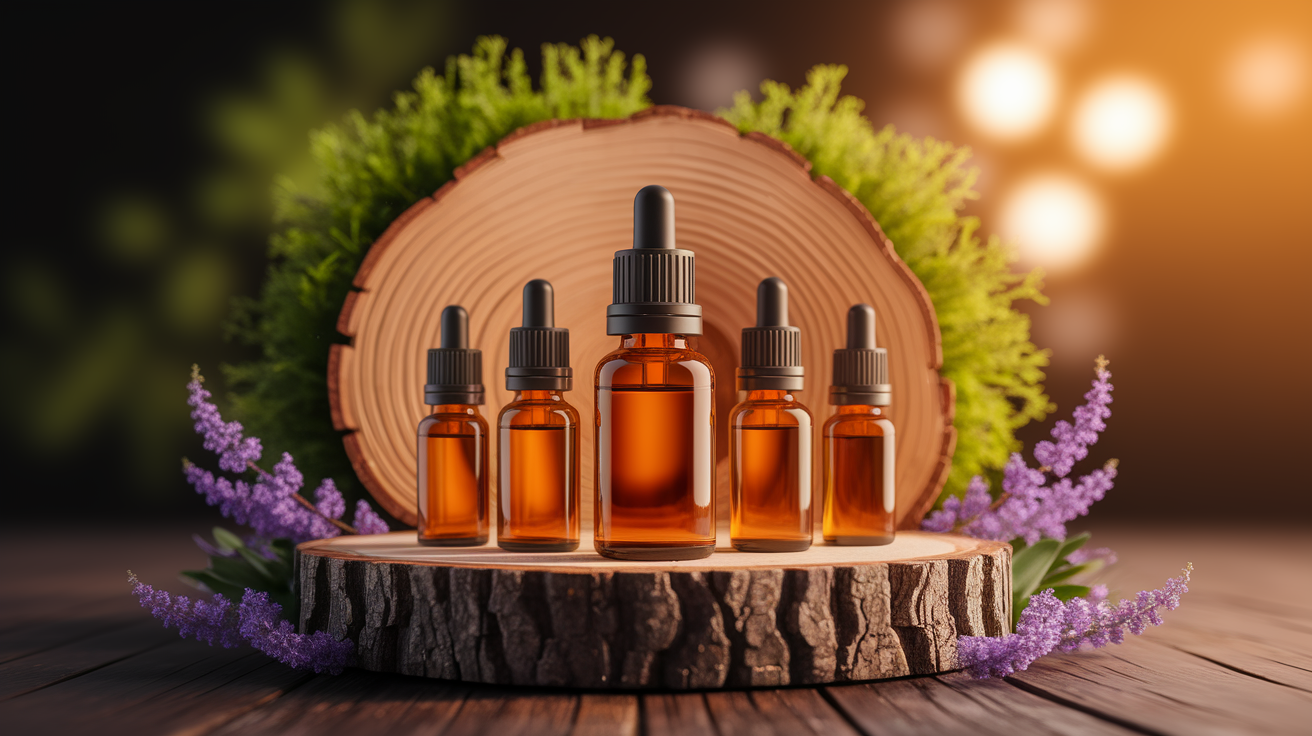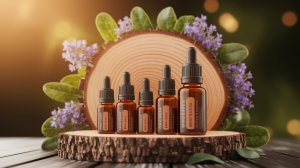Tired of finding evidence of mice in your home but hesitant to use harsh chemicals or traps? Good news—nature has provided some powerful solutions! Essential oils offer an effective, non-toxic way to keep mice away from your property without harming them or introducing dangerous substances into your living space. With just a few drops of the right oils and some simple household items, you can create barriers that mice won’t cross. These natural repellents deter rodents and leave your home smelling wonderful in the process. Let’s explore how you can use essential oils to keep mice at bay using methods that are safe for your family and effective for your mouse problem.

Which Essential Oils Repel Mice Effectively?
Mice have an incredibly sensitive, far more developed sense of smell than humans. This heightened sensitivity makes certain essential oils perfect natural deterrents against these unwanted visitors.
Peppermint Oil
Peppermint oil consistently ranks as the most effective essential oil for repelling mice. Its potent menthol aroma overwhelms their sensitive olfactory senses, making areas treated with this oil deeply uncomfortable.
Rocky Mountain Oils highlights peppermint’s non-toxic nature, making it safe for homes with children while creating a sensory barrier mice won’t cross. The strong scent disrupts their ability to detect food sources and communicate through pheromones.
One important consideration with peppermint oil is its need for regular reapplication. The scent naturally dissipates over time, reducing its effectiveness. Orkin notes that frequent application, typically every 3-5 days in active problem areas, is necessary to maintain its repellent properties.
Spearmint oil offers a similar effect and can be used interchangeably or with peppermint for stronger repellence.

Eucalyptus Oil
Eucalyptus oil provides another powerful option for deterring mice from your home. Its fresh, pungent scent disrupts mice’s navigation abilities and creates an environment they actively avoid.
The distinct aroma contains compounds that rodents find particularly offensive. Rocky Mountain Oils recommends eucalyptus as one of their top suggestions for natural rodent control, noting its effectiveness at entry points and along potential mouse pathways.
Eucalyptus oil can be used in a simple spray solution for easy application. Fantastic Pest Control suggests mixing eucalyptus oil with water and a small dish soap to help the oil distribute evenly. This creates an effective spray for targeting areas where mice might enter or travel through your home.
Other Essential Oils and Natural Repellents
While peppermint and eucalyptus oils tend to be most effective, several other natural substances can contribute to your mouse-repelling strategy:
Citronella, lavender, and cedarwood oils all contain properties that mice find repulsive. These floral and woody scents disrupt mice’s ability to detect food and potential danger. Lavender offers a dual benefit—calming for humans but deterring to rodents.
Clove and cinnamon oils contain compounds that irritate mice’s respiratory systems. Attic Pros recommends placing whole cloves in problem areas or creating diluted cinnamon oil sprays for targeted application.
For persistent rodent problems, solutions containing chili pepper or Tabasco can be remarkably effective. The capsaicin in these spicy substances creates olfactory and physical irritation for mice. These work particularly well in garages and sheds where stronger odors won’t affect living spaces.
White vinegar deserves mention as well. Its acidic smell disrupts mice’s pheromone trails and can prevent them from finding their way back to entry points. The downside is its limited effectiveness in larger spaces and the need for frequent reapplication.

How to Apply Essential Oils for Maximum Repellence
Having the right oils is only half the solution—proper application is crucial for effective mouse deterrence.
Cotton Balls and Sachets
The cotton ball method provides a simple, effective approach that requires minimal supplies:
Take several cotton balls and thoroughly soak them with your chosen essential oil (peppermint works exceptionally well). Place these saturated cotton balls in areas where you’ve noticed mouse activity or potential entry points—along baseboards, in cabinets, near food storage areas, and close to small holes or cracks.
Rocky Mountain Oils recommends fabric sachets filled with cotton and essential oils for more persistent protection. These work beautifully in closets, storage areas, and attics where mice might nest or travel. The fabric slows the evaporation rate, extending the time between refreshing the oil.
For maximum effectiveness, create a perimeter of these scented barriers around your home, focusing on known entry points like gaps around pipes, vents, and foundation cracks. As the scent diminishes, replace or refresh the cotton balls every 3-5 days.
DIY Sprays
Spray solutions offer broader coverage and can reach difficult areas where cotton balls wouldn’t be practical. Here are effective recipes for mouse-repelling sprays:
Peppermint Spray:
- 10-15 drops of peppermint oil
- 1 cup of water
- 1 teaspoon of dish detergent (helps oil and water mix)
Eucalyptus Spray:
- 10-15 drops of eucalyptus oil
- 1 cup of water
- 1 teaspoon of detergent
Orkin suggests applying these sprays around windows, doorways, and known entry points. For best results, reapply every few days or after cleaning surfaces.
These sprays can be used on most surfaces, though testing on a small, inconspicuous area first is recommended to ensure no staining occurs, particularly on fabrics or finished wood.
Commercial Blends vs. DIY Solutions
When deciding between commercial products and homemade solutions, consider your specific needs:
Commercial products like WFMED’s Mouse Away Repellent offer convenience and optimized blends, typically combining peppermint and spearmint oils in precise ratios. These products come pre-mixed and require proper dilution (typically 20% oil to 80% water) to prevent staining.
DIY solutions allow for customization and often cost less in the long run. You can adjust the scent and strength based on your specific situation and preferences. The ingredients are readily available; you can make fresh batches as needed.
Both approaches can be effective for mouse deterrence. Your choice might depend on the severity of your mouse problem, budget considerations, and how much time you’re willing to invest in preparation.
Safety Considerations When Using Essential Oils
While essential oils provide a natural alternative to chemical repellents, proper usage ensures safety and effectiveness.
Use Around Pets and Children
When using essential oils to repel mice in homes with pets or children, extra caution is necessary:
Cats are particularly sensitive to essential oils, especially tea tree, citrus, and pine oils. If you have felines, use peppermint or eucalyptus oils in areas your cats cannot access, or use more diluted solutions. Dogs have a more varied tolerance but can still be sensitive to strong concentrations.
For homes with children, place cotton balls or sachets in areas out of reach. With sprays, allow surfaces to dry completely before children can touch them.
Attic Pros specifically warns against alternatives like mothballs or ammonia, which pose significant risks to pets and humans. When used properly, essential oils provide effective deterrence without these dangers.
Concentration and Continuous Exposure
Essential oils are potent substances that should be respected:
While mice find certain scents overwhelming, humans can also experience irritation from high concentrations. Orkin notes that concentrated peppermint oil may cause respiratory irritation or skin sensitivity in some individuals.
Start with lower concentrations (5-10 drops per cup of water) and increase if needed. Full-strength essential oils are unnecessary for most home applications and could cause irritation.
Ventilation matters—particularly when using sprays. Ensure adequate airflow in treated areas, especially if you or family members have asthma or other respiratory conditions.
For continuous exposure, rotating between different oils can sometimes increase effectiveness while reducing the risk of sensitivities developing. Alternating peppermint and eucalyptus works particularly well for long-term mouse prevention.
Wrap-Up: My Final Thoughts on Natural Mouse Repellence
Natural mouse repellence is achievable with the right essential oils and application methods. Peppermint oil stands out as the clear frontrunner, with eucalyptus following closely behind. These powerful plant extracts offer an effective alternative to traditional chemical repellents or traps.
Success with essential oils requires consistency and strategic application. By placing cotton balls or sachets near entry points and regularly applying spray solutions in problem areas, you can create an environment that naturally deters mice without harming them or introducing toxins into your home.
Remember that essential oils work primarily as a preventative measure or for addressing minor infestations. For severe mouse problems, you might need to combine these natural methods with other approaches or consult with professional pest control services.
What makes essential oils truly special for mouse repellence is the dual benefit—while deterring unwanted visitors, you’re also filling your home with pleasant, natural scents that can enhance well-being, making it a win-win solution for those seeking harmony with nature while protecting their properties.













